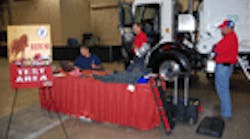SAN ANTONIO, TX . Demand for truck technicians is surging again, especially among dealerships, as the overall age of the industry’s fleet reaches levels not seen in decades and sales of new equipment remains below historical norms.
“We are busy enough already, with all the older equipment out there now,” Mike Besson, vp-operations for Rush Truck Centers (RTC), a division of Rush Enterprises, told Fleet Owner here at the company’s fifth annual “Tech Skills Rodeo” competition.
With the average age of Class 8 trucks in U.S. fleets now pegged at 6.5 years – the highest it’s been in 30 years – dealers Like Rush are witnessing a spike in parts and service demand. Fred Scott, service manager for RTC’s San Antonio facility, said demand has “exploded” since this April.
“We now have 50 technicians on staff at our location alone because of this increase in business,” Scott told Fleet Owner. Those higher business volumes resulted in over $600,000 worth of technician labor hours billed out in October this year alone. “Everybody is looking for technicians now,” he added.
The challenge Rush and other truck dealers face is bringing new blood into the truck tech field while keeping the highly-skilled veterans already in the ranks to keep pace with what’s expected to be a high level of demand for some time to come.
“That’s what this contest does for us and why we kept holding it through the downturn,” Rush’s Besson said. “Our mission with this is to create something you won’t see at another company – a chance to not only win cash and prizes but a pay raise as well. The second is to show the new kids we’re trying to recruit into this field that this is a line of work with challenges and opportunities you won’t see sitting behind a desk.”
Rush’s program aims to deal with the generational shift occurring within the U.S. workforce, Over the next 20 years, 77-million Baby Boomers will but they will be replaced by only 46-million new workers, according to numbers tracked by the American Society for Training and Development (ASTD).
To further its recruitment goals, RTC is working to help local schools, such as Laredo Community College (LCC), to improve the quality of their trucking-related courses, which run the gamut from truck driver training programs to diesel engine mechanics and repair courses.
Another example of this effort is how RTC’s Laredo TX facility is working with truck OEMs to secure a range of computer-based diagnostic software so LCC can upgrade its diesel instructional programs. This move will also allow the school to access newer-model vehicles as needed, such as late model Class 8 used trucks equipped with 2007 emissions-compliant technology as well as new Peterbilts equipped with 2010 emissions-compliant technology and the new Paccar MX engine.
“Not only does our partnering help the college to supply quality training to future technicians, more importantly, [it] helps develop ready and capable technicians available for hire to work at our dealership after graduation,” noted Lewis Woodul, GM for RTC’s Laredo store.
RTC’s Besson added that the focus isn’t just on the heavy-duty segment of trucking. “The [truck] market has changed so very much in the past few years,” he points out. “We’re seeing an awful lot of medium-duty equipment now and most of those [medium-duty] guys don’t have their own shops. So they are looking to us to take care of their trucks.”
For that reason, RTC split its annual contest into two categories – heavy- and medium-duty – while adding a new “vocational” class this year, focused on refuse equipment.
Out of RTC’s roughly 800 to 900 total technician workforce, some 350 took 700 written exams to qualify for the 2010 Rush Tech Skills Rodeo. The 65 high scorers were invited to the hands-on competition in San Antonio.
Working on nine Class 8 Peterbilt tractors, nine medium-duty models--three Isuzu NQR units, three Hino 238 straight trucks and three International DuraStar vehicles-- those 65 will be culled to a final group of 15: nine heavy-duty and six medium-duty technicians as well as five techs competition in the refuse category.
At stake is the chance to win from $3,000 to $5,000 in cash and anywhere from a $1 to a $1.50 per hour raise in pay.
Besson said the contest helps motivate RTC techs to keep improving their skills while encouraging them to stay with the company for the long haul.
“A guy doesn’t leave you for 25 to 50 cents more per at the shop across the street; he’s leaving because he doesn’t like where he’s working,” Besson remarked. “This contest is one of the ways we try to make ourselves better and different as employer while encouraging them to be better at what they do.”



